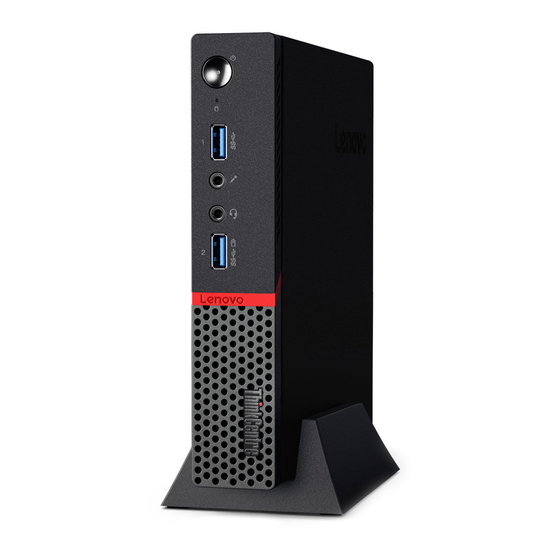Lenovo 10GA Benutzerhandbuch - Seite 19
Blättern Sie online oder laden Sie pdf Benutzerhandbuch für Desktop Lenovo 10GA herunter. Lenovo 10GA 20 Seiten.

• Memory slot
Network features
• Ethernet LAN
The integrated network interface card supports the Ethernet connector on your computer.
• Wireless LAN (available on some models)
• Bluetooth (available on some models)
Security features
For more information, see Chapter 4 "Security" on page 31.
System management features
• Ability to store power-on self-test (POST) hardware test results
• Desktop Management Interface (DMI)
Desktop Management Interface provides a common path for users to access information about all
aspects of a computer. The information includes processor type, installation date, connected printers and
other peripherals, power sources, maintenance history, and so on.
• ErP LPS compliance mode
The energy-related products directive (ErP) lowest power state (LPS) compliance mode reduces the
consumption of electricity when your computer is in sleep or off mode. For more information, see
"Enabling or disabling ErP LPS compliance mode" on page 38.
• Preboot Execution Environment (PXE)
Preboot Execution Environment enables computers to start through a network interface independent of
data storage drives (such as hard disk drives) or installed operating systems.
• System Management (SM) Basic Input/Output System (BIOS) and SM software
The SMBIOS specification defines data structures and access methods that can be used to read
management data stored in the BIOS of a computer.
• Wake on LAN
Wake on LAN is an Ethernet computer networking standard that allows a computer to be turned on
or woken up by a network message. The message usually is sent by a program running on another
computer on the same LAN.
• Wake on Ring
Wake on Ring, sometimes referred to as Wake on Modem, is a specification that allows supported
computers and devices to resume from sleep or hibernation mode.
• Windows Management Instrumentation (WMI)
Windows Management Instrumentation is a set of extensions to the Windows Driver Model. It provides an
operating system interface through which instrumented components provide information and notification.
.
Chapter 1
Product overview
9
